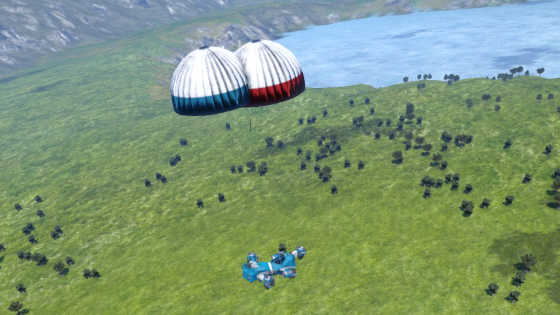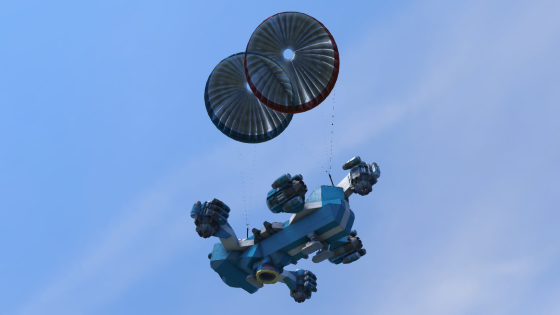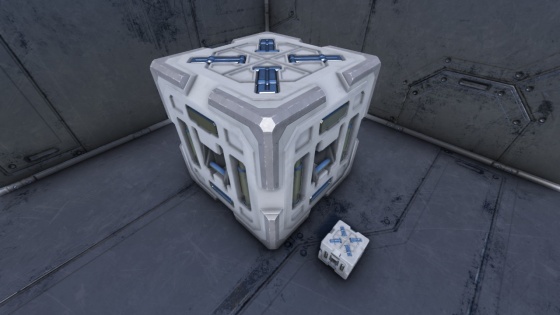Parachute Hatch
Contents
Overview
The Parachute Hatch is a re-loadable parachute deployment block. It consumes Canvas materials with each deployment (1 for small grid, 5 for large grid), but is otherwise reusable. It allows players to rapidly slow their craft in-atmosphere (regardless of which direction they are moving in) and/or gently lower their craft to the ground. Thus, players can deliver craft or items from orbit to ground without requiring expensive thrusters on the craft to prevent a crash. It can also be used as a backup landing mechanism in case too many lift thrusters are damaged or destroyed. The block itself is based on the Ship Parachutes mod which was developed by Harax, Mexpex and Draygo.
Usage
To use, place 1 or more parachute hatches on your craft and stock them with canvas. It is recommended to keep parachutes aligned with your center-of-mass, since once the parachute is opened your craft will hang from it at whatever point it is attached. The parachute can be deployed manually by "Opening" the hatch, or automatically at a specified altitude. The hatch will "Close" and the parachute will be automatically detached (and cease to exist) when the craft comes to a complete stop either on the ground or in a hover (if the craft has sufficient downwards thrust and dampeners enabled). The hatch can also be manually closed at any time, discarding the parachute.
Control Panel
| Open / Closed | Deploys ("Open") or detaches ("Closed") the parachute. |
|---|---|
| Auto deploy | Whether auto deploy is on or off |
| Auto deploy height | Height that the parachute will automatically deploy if auto deploy is On Min: 10m Max: 10,000m |
Terminal Velocity
When deployed, parachutes quickly slow the craft to a fraction of its original speed, however they do not immediately slow the craft to its terminal velocity. After the rapid deceleration immediately following deployment, the craft will gradually slow to its terminal velocity.
It is possible to calculate a craft's terminal velocity, in order to gauge how soft or hard the landing will be:
Ship-specific variables
MASS - in kg GRIDSIZE - 0.5 for small grid parachute, 2.5 for large grid parachute QTY - number of parachutes
Planet-specific variables
GRAVITY - in m/s2 (9.81 for Earth-like planets) ATM - atmosphere, changes with altitude (from 0 to 1.0 on Earth-like planets)
Constants
RADMULT - radius multiplier, always = 8 REEFLEVEL - reefing level, always = 0.6 CD - drag coefficient, always = 1.0
Calculations
parachute diameter = (log((10*(ATM-REEFLEVEL))-0.99)+5)*RADMULT*GRIDSIZE area = PI*(diameter/2)^2 terminal velocity = squareroot((MASS*GRAVITY)/(area*CD*QTY*ATM*1.225*2.5))
Example: Standard Red Ship
MASS = 2927310
GRIDSIZE = 2.5 (large grid)
QTY = 10 (it's a big ship!)
GRAVITY = 9.81 (we'll say this is an Earth-like planet)
ATM = 0.85 (avoid using 1.0 - 0.85 gives a more conservative result)
diameter = (log((10*(ATM-REEFLEVEL))-0.99)+5)*RADMULT*GRIDSIZE
= (log((10*(0.85-0.6))-0.99)+5)*8*2.5
= 103.6
area = PI*(diameter/2)^2
= 8,429.6
terminal velocity = squareroot((MASS*GRAVITY)/(area*CD*QTY*ATM*1.225*2.5))
= squareroot((2927310*9.81)/(8429.6*1.0*10*0.85*1.225*2.5))
= 11.4 m/s
Media
Tips
- Parachutes and mountains do not get along. Where possible, try to use a parachute over low-elevation terrain.
- Large grid parachutes have 25x more drag than a small grid parachute. Use large grid parachutes for heavy drops.
- Parachute drag will oppose your direction of motion in atmosphere, even if you are trying to fly UP.
- You need electrical power on a grid to deploy or cut the chutes, but while the chutes are deployed power is not strictly necessary. The parachute will stay out while the power is gone, and will even stay out if the block is damaged to a non-functional state!
- On a ship with low weight and many parachutes, parachutes might automatically cut when the ship velocity drops below 2 m/s. If you start falling because of this then the chutes will re-deploy if set for automatic deployment. In Survival Mode this would cause you to expend more canvas. If this happened repeatedly, you could run out of canvas before reaching the ground.
Known Issues
Programming
Update History
| Update 1.183.1 |
|
| Update 1.183.0 |
|


